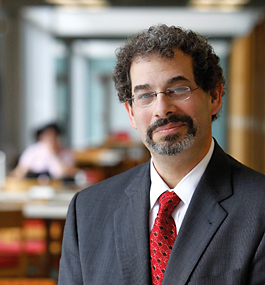Alumnus Returns as Provost
As a scientist, teacher, administrator and pediatrician, Steve Goldstein has dedicated his life to nurturing human potential.

Mike Lovett
Steve A.N. Goldstein ’78
Provost-elect Steve A.N. Goldstein ’78, professor of pediatrics, founding director of two prominent research institutes and former physician-in-chief of a major children’s hospital, will become Brandeis’ next provost Sept. 1. In his new job, Goldstein will be the university’s chief academic officer and the second ranking member of the administration after President Fred Lawrence. He succeeds Marty Wyngaarden Krauss, Ph.D.’81, who stepped down in June after eight years as provost.
Goldstein returns to Brandeis following a distinguished career at Yale and the University of Chicago. From 1993 to 2004, he was on the faculty at the Yale University School of Medicine. He moved to the University of Chicago in 2004 to become chairman of the department of pediatrics and physician-in-chief at Comer Children’s Hospital. He is a professor of pediatrics, computational neuroscience and molecular medicine at the University of Chicago Pritzker School of Medicine and founding director of the Institute for Molecular Pediatric Sciences and the Institute for Translational Medicine.
As an undergraduate, Goldstein was elected to Phi Beta Kappa and earned both a bachelor’s and master’s degree in biochemistry, magna cum laude, in four years. He credits pivotal experiences in college with shaping his future, including independent research in organic chemistry that opened up the world of scientific discovery to him.
“There was an extraordinary Thursday night when I was doing one of the first experiments I ever did completely by myself. I was a sophomore doing discovery science in organic chemistry,” recounts Goldstein, “and it was a eureka moment when crystals started to form out of the solution. That’s when I knew that what we had predicted was actually taking place.”
Biochemist Chris Miller introduced Goldstein to his lifelong scientific interest, ion channels — membrane proteins that surround all biological cells and play critical roles in health and illness. “I still retain a vivid memory of Steve as a top student in the very first class I taught at Brandeis, in 1978,” says Miller. “His enthusiasm for the geeky stuff I teach was satisfying for a new teacher, and the energy palpably bursting out of him was exhausting just to observe.
Goldstein went on to earn an M.D. and a Ph.D. in immunology from Harvard University, graduating in 1986. He completed his pediatric internship, residency and a clinical fellowship in pediatric cardiology at Children’s Hospital Boston. Then, starting in 1989, he returned to Miller’s lab on a postdoctoral fellowship.
“The best place in Boston to do ion channel research was with Chris Miller, and I had an incredible learning experience that demanded that I be at the tip of my toes, pushing the envelope, creating as I went,” says Goldstein. “In Chris’ lab there was a wonderful joie de vivre.”
Goldstein, a leading authority on the molecular mechanisms underlying normal cardiac function and sudden life-threatening diseases of the heart, plans to continue his research on ion channels despite the demands of being provost.
As the 54-year-old native New Yorker deepens his understanding of Brandeis’ challenges and opportunities over the summer, Goldstein says he wholeheartedly endorses the university’s commitment to an interdisciplinary and personalized approach to learning and teaching. “Here, students are given a remarkable opportunity to pursue their dreams,” says Goldstein. “I cannot think of a more exciting challenge than returning to Brandeis to help others find new ways to shape the world in which we live.”
